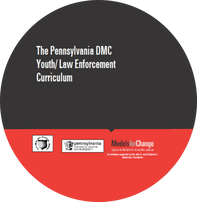Reducing Racial and Ethnic
Disparities in the Juvenile Justice
System.
Across all projects, the Juvenile Justice Research and Reform Lab seeks to address inequities in the juvenile justice system and eliminate racial and ethnic disparities in juvenile justice contact, processing, and outcomes through research, training, and policy and practice reform. The Lab also seeks to address inequality more broadly, recognizing and targeting disparities in gender, age, LGBTQ+ identity, special education status, mental health needs, and the intersection among these characteristics and more.
In addition to prioritizing equity at the center of all projects, the Lab emphasizes work to promote procedurally just policing practices and prevent disparate entry of youth into the system. For example, the Lab partners with juvenile justice stakeholders in Philadelphia to evaluate the effectiveness of the Pennsylvania Disproportionate Minority Contact (DMC) Youth/Law Enforcement Curriculum. The DMC Curriculum is a training program that brings youth and officers together to improve relations between police and young people in their communities, educate officers about cultural and developmental differences in adolescents' and adults' behavior, and teach officers de-escalation techniques that are particularly effective with youth.
The JJR&R Lab also collaborates with jurisdictions across Pennsylvania and throughout the United States to evaluate implementation of the DMC Curriculum with fidelity and determine how the program impacts officers and youth.
In addition to prioritizing equity at the center of all projects, the Lab emphasizes work to promote procedurally just policing practices and prevent disparate entry of youth into the system. For example, the Lab partners with juvenile justice stakeholders in Philadelphia to evaluate the effectiveness of the Pennsylvania Disproportionate Minority Contact (DMC) Youth/Law Enforcement Curriculum. The DMC Curriculum is a training program that brings youth and officers together to improve relations between police and young people in their communities, educate officers about cultural and developmental differences in adolescents' and adults' behavior, and teach officers de-escalation techniques that are particularly effective with youth.
The JJR&R Lab also collaborates with jurisdictions across Pennsylvania and throughout the United States to evaluate implementation of the DMC Curriculum with fidelity and determine how the program impacts officers and youth.


